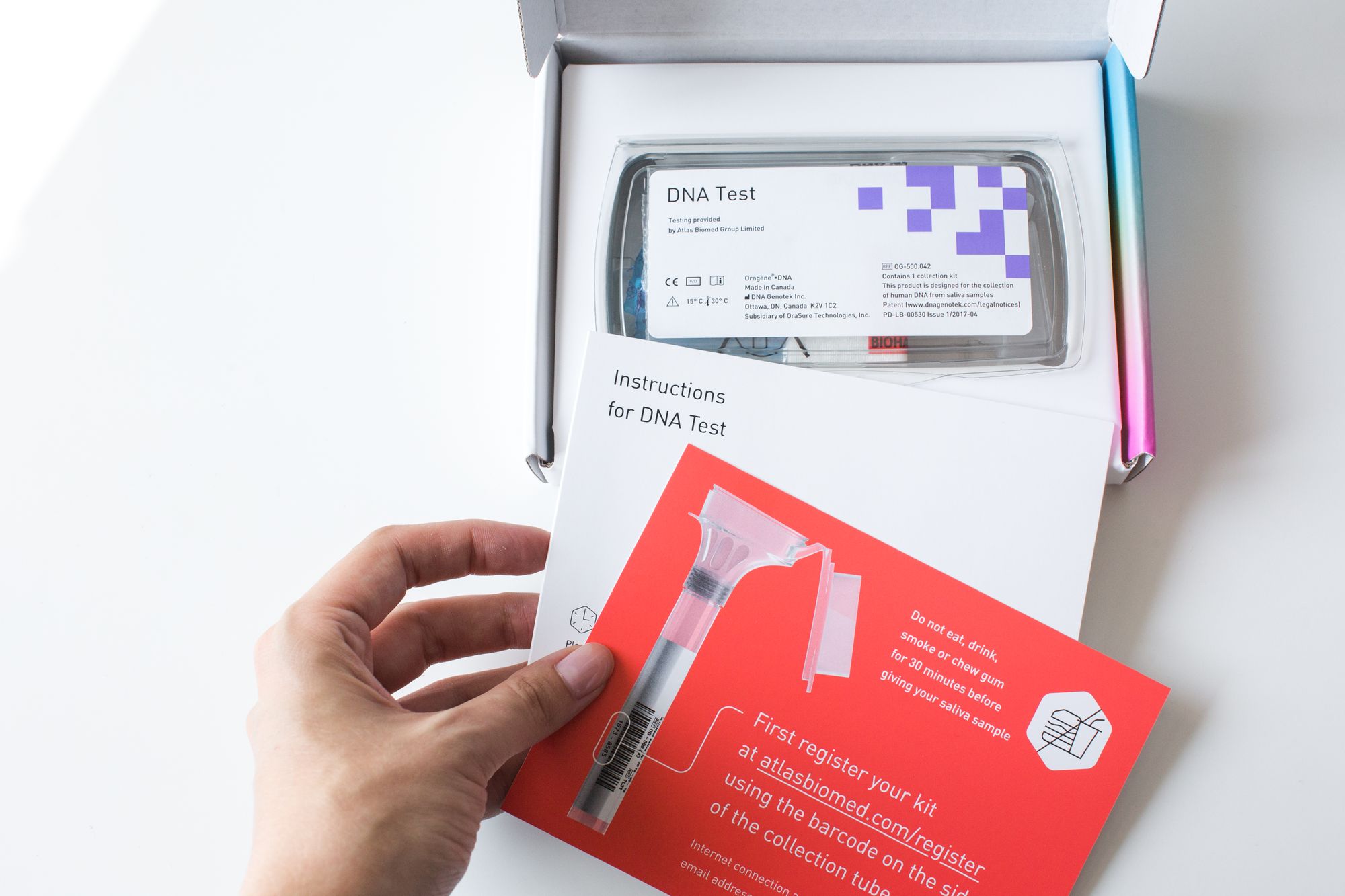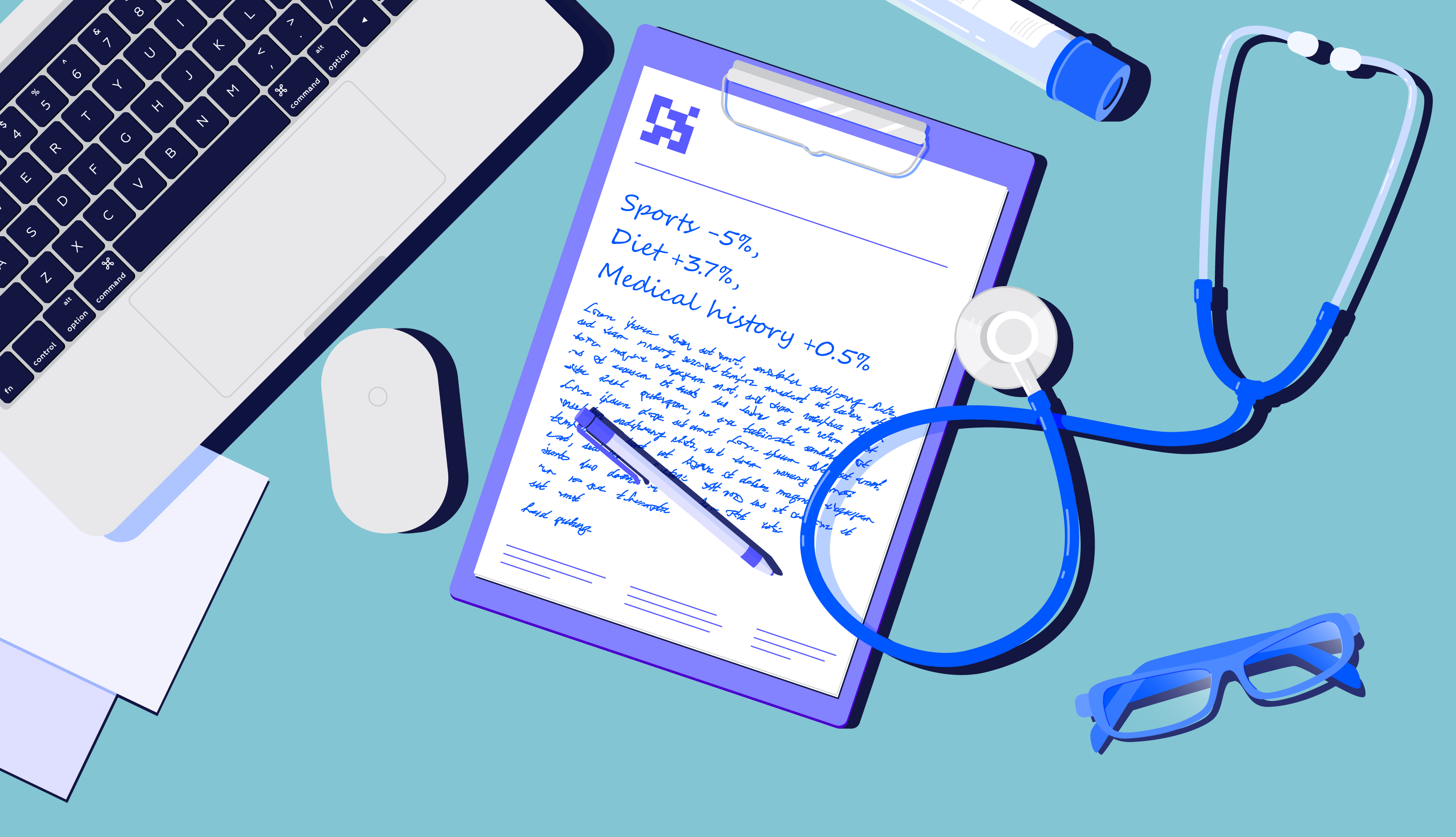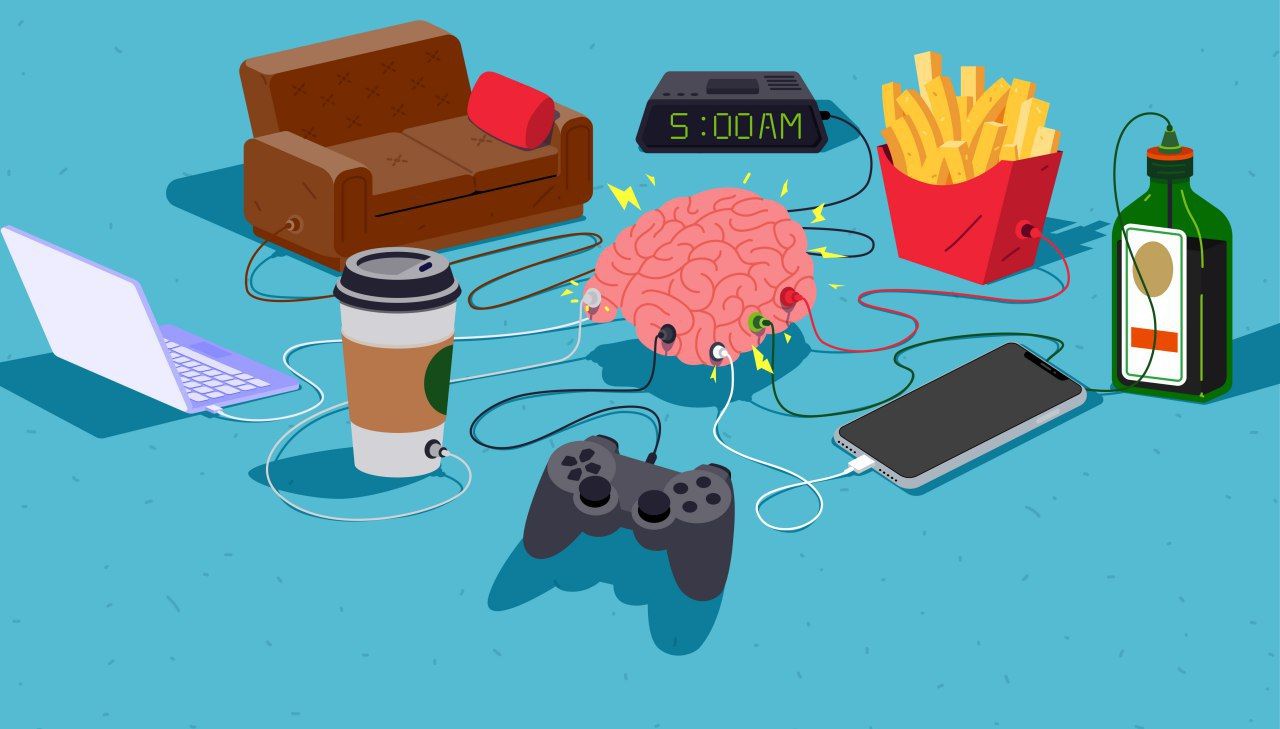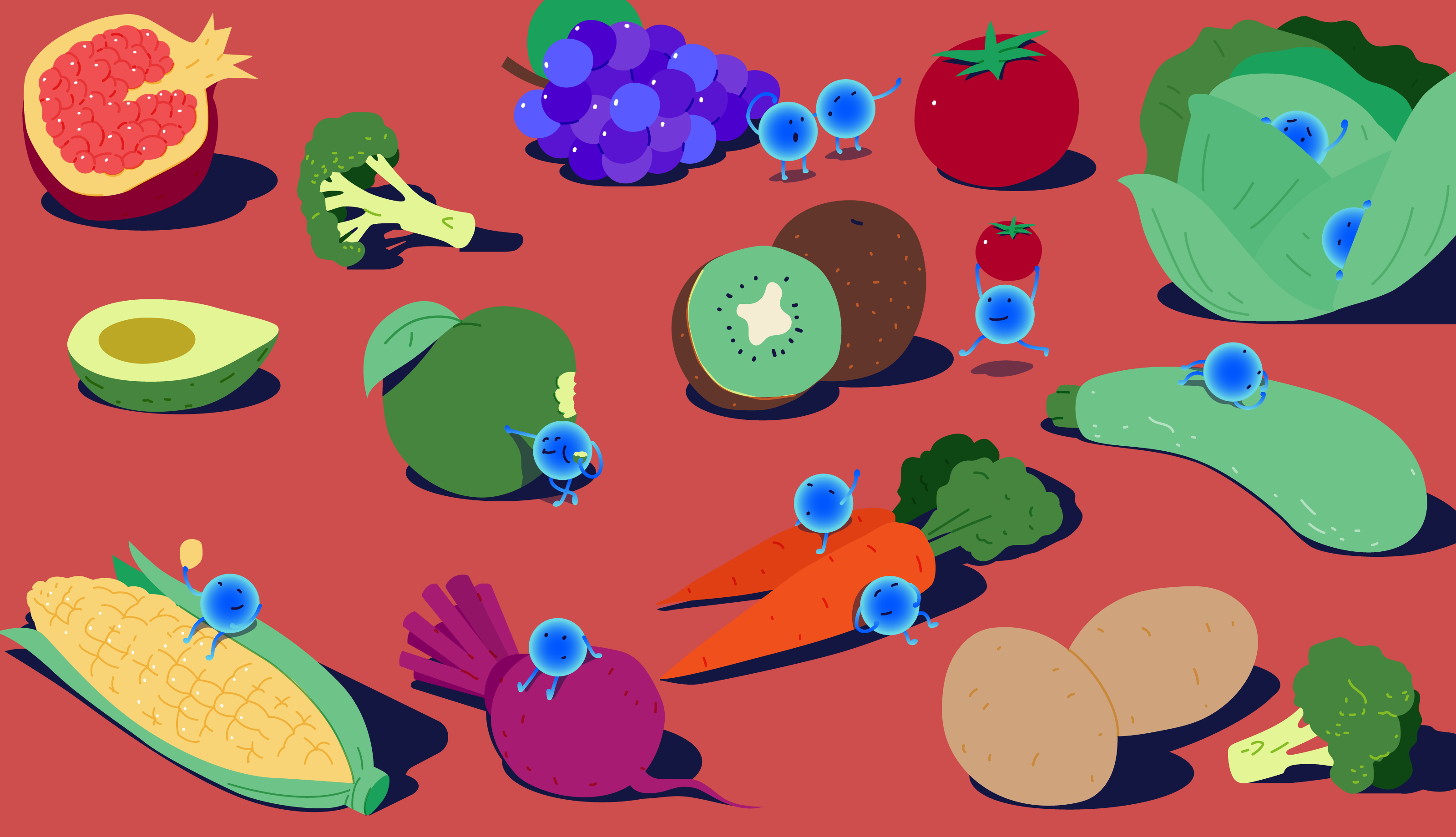When you take an Atlas Test, you’re asked to fill in a health and lifestyle questionnaire too.
DNA sequencing technologies are incredible tools in the right hands. They can detect variations at molecular level that distinguish you from your parents, partner, children, and neighbours. It’s these differences that make you truly unique. They also help determine specific risks to your health.
☝️IMPORTANT☝️The information in your health questionnaire is completely anonymous. No one has access to it but you. Our algorithm uses these data to improve the accuracy of your disease risk calculations.
Table of contents
Here's some quick links to access the topics you're interested in if you're already filling out your questionnaire.
- Why is it important?
- Your life contains vital health data
- Body measurements
- Habits, sleep, and exercise
- Food, fiber, and liquids
- Medical history
- Your answers autosave
- Why are there so many questions?
1. Why is it important?
Your genome and gut microbiome can reveal important information about your health and future wellbeing, but it’s not so cut-and-dry.
- Take me to the health questionnaire now
Biological life is complex because there’s far more to life than just genes and bacteria. Your family history, personal history, and daily choices also contain critical information about your own unique set of health risks that your DNA and microbiome can’t.
Our algorithm creates personalised risk and health profiles using data from several inputs: your DNA and/or microbiome test, and a comprehensive background questionnaire to identify risks pertaining to your medical history, environment, and lifestyle.
If you take one test (DNA or microbiome), you’ve completed one step in this process. If you want a full health profile, you’ll need to take both tests. Either way, there’s a third step, and it’s free when you take a test: the health questionnaire.
Today we’re going to explain exactly why you need to take it, and what questions to expect. The health questionnaire only takes about 20 minutes to complete, but it’s pivotal if you want the most reliable assessment of your health, and the most accurate recommendations.
2. Your life contains vital health data
How you answer the questions in this survey of your diet, lifestyle, and medical history can change your risk profile and recommendations.
But you already know this, right? Because you’ve read the newspapers and it’s hard to forget that bacon is a carcinogen, or that drinking too much alcohol on a regular basis can seriously damage your liver.
Fortunately, our questionnaire is not based on anecdotal evidence that gets picked up in the media for a juicy headline. It was established by two teams of experts, one focused on DNA and lifestyle medicine, the other specialised in your gut microbiome.

Our tests are like Ikea furniture: ALWAYS read the instructions first
The questions come from reliable scientific evidence, and the answers you give are also weighted based on these studies. They are computed by our algorithm, alongside your test results, to give you the most accurate portrayal of your disease risks and health recommendations.
Below, we’ll explore the different parts of the health questionnaire, but first you’ll need to collect a few essential items to help you assess these parameters accurately:
- measuring tape
- body weight scale
- notes app & calculator (smartphone)
- measuring cups
- kitchen weighing scales
- a phone
- relatives' contact details
Indeed, looking at the list, you might suddenly wonder what you’ve got yourself in for. Rather than fudge your questionnaire because it’s faster (we’ve all been there, don’t worry), take a second to think about the implications of doing a rushjob.
After all, you’ve paid good money to get your Atlas Test, and you deserve to get the most accurate health profile. Did we mention that you can come back and update it when we launch updates to include new findings (or because something in your life has changed)?
So set yourself up for success with this ultimate guide to acing your health questionnaire like a boss!
3. Body measurements
This part of the questionnaire is all about you, starting with some basics about your physical appearance and basic data.
You’ll be asked some basic stuff, like sex, date of birth, and height. You’ll also be asked about your weight and waist circumference. Things like your ratio of height-to-weight and waist circumference are helpful indicators for assessing body mass.
| Measurement | What you’ll need |
|---|---|
| Weight (kg): | Body weight scales |
| Waist circumference (cm): | Measuring tape |
| Notes app or notebook |
Being overweight or underweight comes with specific health risks for chronic diseases, bone density, and other ailments. Don’t worry, the research selected for your risk analysis doesn’t just take into account your physical status, it weighs this information against other data like current health problems, frequency of physical activity, and more.
There are instructions to help you correctly measure your waist circumference. This parameter is an indicator of body fat distribution, helping to identify whether there is significant weight carried around the abdomen, which can be a risk factor for chronic diseases like type 2 diabetes, hypertension, and other cardiovascular diseases.
If you have a history of disordered eating or anxiety related to your appearance that may be triggered by body weight measurements, ask someone you trust (a partner, sibling, or parent) to take down the numbers for you and input them into the questionnaire.
It’s okay to feel uncomfortable during this section. Remember that no one is judging you, and no one is looking at your answers. This information is just, well, information for our algorithm to help you find actionable ways to enhance your health.
4. Habits, sleep, and exercise
Every day, you eat, drink, and move. These questions are designed to assess how this contributes to your health and disease risks.
Smoking
In this section, we are trying to evaluate your exposure to health risks in your daily life. It’s pretty simple. We’ll ask you if you smoke and whether you are exposed to passive smoke (like on your lunch breaks with colleagues).
Alcohol
We’ll also get onto the sticky topic of alcohol, and let’s face it, many of us like to think we drink less than we actually do. So try to keep a tally of your alcoholic beverage intake for an average week, counting what you drank each day, and how many glasses of it (including serving size).
You’ll also be asked what quantity you drink per week. To keep it simple, we ask you in milliliters (mL) - our system calculates the number of units based on this information. That’s why you should keep a record of your serving sizes. But here’s a rough guide to help you:
| Beverage serving | Quantity, mL |
|---|---|
| Beer, pint | 474 mL |
| Wine, medium glass | 175 mL |
| Wine, large glass | 250 mL |
| Wine, bottle | 750 mL |
| Spirits, shot | 30 mL |
| Spirits, bottle | 750 ml |
It’s important to know that our species is notorious for fudging self-reported information on diet and alcohol consumption. Historically, researchers have struggled with data sets such as these because we tend to overreport good behaviour and minimise bad habits.
That’s why keeping a journal for one week with your average alcohol consumption will likely be more reliable than guessing, especially if you have a hangover (not great for memory). You might find this process a bit awkward, but don’t overthink it. Remember, our algorithm doesn’t have opinions, it has equations and facts.
Sleep
Sleep is an essential mechanism that allows our tissues to repair and heal, clear out the debris, and process information from the day. It goes without saying that sleeping too much or too little are both not ideal scenarios.
Interestingly, not getting enough sleep and “feeling great” has become a badge of pride in modern society. However, this type of behaviour is unhealthy for many reasons: it disturbs many delicate and essential metabolic processes that can contribute to chronic diseases.
The questionnaire will ask how many hours you sleep per night. You can do this manually, in your notes or, if you have a smartwatch, you can download a sleep tracking app like Sleep Cycle or
Pillow to do it for you!
☝️IMPORTANT☝️We are not paid to advertise these apps. They are simply recommendations from our team who also use them to track their health.
Physical activity
At work: the world is made up of different jobs, some include high-intensity bursts of exercise, others a bit of brisk walking here and there, and many don’t require any physical effort at all. It’s okay if you don’t, our work at Atlas isn’t physically taxing either.
In your spare time: do you walk to work or go for a walk at lunch time? Maybe you cycle or hit the gym. Either way, take note of your physical activity in your notebook, or record it with a smart watch and check the data on your phone before answering this question.
Intensity: our questionnaire differentiates between high- and low- or moderate-intensity exercise. All are beneficial for your health, but this distinction is relevant when comparing your data to the precise findings of scientific studies.
Sedentary behaviour
Nowadays, sitting is the norm. Office work, driving, and commuting count as sitting, so does binge-watching Netflix and playing video games. Try to estimate how many hours you sit and lie per day (excluding sleeping) and make a note of it in your journal.
5. Food, fiber, and liquids
Scientific studies link specific diets and food choices to health and disease risks, so get ready for a pretty comprehensive review.
As we’ve mentioned, humans tend to fudge self-reported data on their diet and food intake, making it sound better than it often actually is. We’ve tried to keep the food portion of this questionnaire simple, but it still requires some basic measurements.
Fruit and veg
We often ask for the quantity per week, like pieces of fruit, so it helps to keep track of what you eat every day for seven days. This is especially important when it comes to vegetable intake, which is recorded in grams.
If you make a salad, weigh the whole vegetable mass before adding dressing, meat and cheese, and nuts. This will give you a total weight in grams. Remember, vegetables don’t include starches (like potatoes, bread, or pasta) or nuts and legumes.
We also differentiate between cooked and raw (fresh) vegetables, and this is why a notebook can come in handy. If you have a chalkboard or whiteboard in the kitchen, you can also make your notes there!
It can be harder to keep track if you are cooking for your family, but you can always track the whole quantity cooked and then figure out the average amount you serve yourself (maybe it’s 25% of the total, more or less).
Liquids
You’ll be asked to track how much liquids (non-alcoholic) you consume per day in milliliters (mL). This includes water, coffee, tea, juice, and even soup. Make a note of this in your journal or, if you have a strict routine, you might be able to remember that way too.
Alternatively, just measure out the liquid content in your favourite beverage containers (one glass, one mug) and only use them for 7 days. That way, you don’t have to track different measurements, only the frequency of your drinks.
| Serving container | Quantity, mL |
|---|---|
| Cup, standard | 180 mL |
| Mug, standard | 240 mL |
| Venti, Starbucks (hot) | 590 mL |
| Water bottle, small | 500–600 mL |
| Can, standard | 330 mL |
| Sports water bottle (reusable) | 500–1,000 mL |
Fiber intake
Essential nutrients
Severe nutrient deficiencies are a thing of the past because, if your diet meets minimal levels, you can avoid acute direct consequences. However, minimal levels of nutrients are not enough to keep other disease risks low too.
If your diet consists mainly of processed foods, take-aways, and fast foods, you won’t develop severe vitamin deficiency, but you will not protect yourself from chronic metabolic and eye diseases.
We’ll ask you if your diet contains sources of vitamins, fatty acids, and minerals, and give some examples to guide you. Later on, you’ll also be asked if you take any specific supplements too.
Fats, salt, meat, and sugar
You’ll be asked several questions about your consumption of foods that are found in the Western diet. These foods are high in salt, refined sugars, and fats. High intake of fast, processed and refined foods is linked to a range of chronic metabolic diseases like diabetes type II, obesity, and heart disease.
Food reactions
We’ll ask you if you have any specific reactions to foods, like runny nose, inflamed sinuses, or breathing difficulties after consuming certain fruit, vegetables, starches, nuts, and animal products.
6. Medical history
This section is rather simple in comparison to the gruelling diet interrogation you’ve just undergone.
By now, the progress bar will show you are at 50%, but don’t worry, you’re actually nearly finished. In fact, just a few clicks and you’re home free!
We’ll ask you if you’ve ever been diagnosed with specific illnesses and when, so read the list carefully to make sure you don’t miss any! There’s also a question dedicated to any symptoms you might have been experiencing when you gave your stool sample (for the Atlas Microbiome Test only).
After that, you’ll be asked for information about your family’s medical background and if any first-degree relatives (parents, siblings, children) have been diagnosed with specific diseases, followed by some questions about any supplements you might be taking.
If you're not sure about your family medical history, it's worth picking up the phone and contacting a well-informed relative to check if any of these diseases have been diagnosed in family members.
7. Your answers autosave
Remember that you can pause the health questionnaire at any time and your results will be saved!
This questionnaire may, at times, seem tedious and, possibly, unnecessarily detailed. Rest assured, we have actually distilled these questions as much as possible. It comes from the nature of scientific research, which is complex and specific by necessity.
Remember, if your face looks like this, it means you're nearly finished
We’ve taken that into account because we know that you might not have all the answers at your disposal. Hopefully, if you keep track of your normal eating and exercise habits for just one week, you’ll have everything you need to complete your questionnaire like a rockstar!
8. Why are there so many questions?
Your personalised health risks are often a combination of lifestyle, environment, genetics, and diet. Your DNA and gut bacteria are only part of the story.
Take me to the health questionnaire now
It’s important for us to get a full overview of your background, because if we just provided you with genetic risks and microbiome results, you’d only have part of the picture. There’s a significant body of evidence (that’s growing every month) on how other factors influence chronic diseases.
Without this level of detail, researchers would not have “robust” studies, and more importantly, we couldn’t offer the most reliable and accurate recommendations for the circumstances and choices that make you truly unique.
If you get confused by a question, email [email protected] and our awesome customer care expert, Wolfgang, will help you out.




















